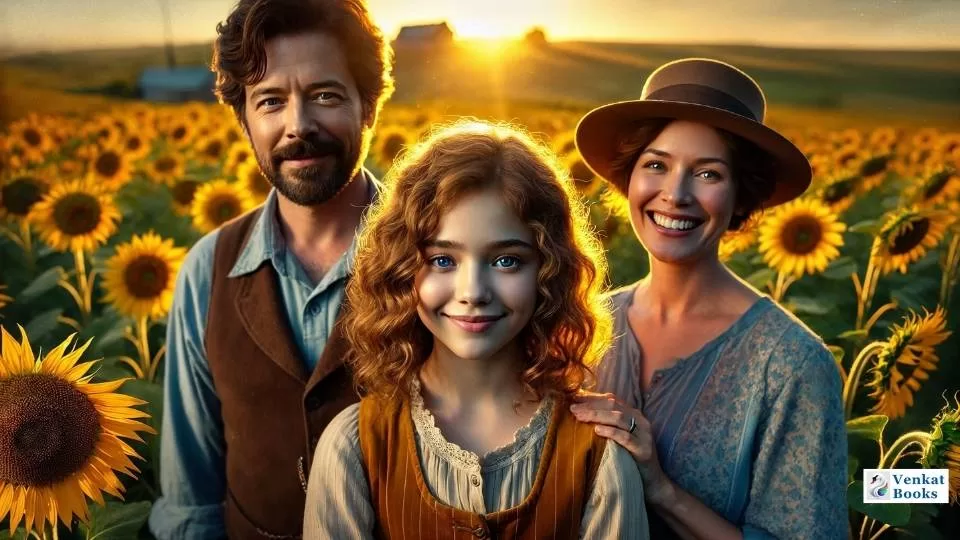Whispers to the Stars: Sarah’s Secret Hope
Chapter 1
In the year 1925, amidst the vast, undulating plains of South Dakota, there existed a quaint village that seemed untouched by time. The village was small—just twenty humble homes dotted the landscape, each built with sturdy timber and capped with sloping roofs that withstood the prairie winds. Dirt roads wound between the houses, leading to sprawling fields where wildflowers danced in the breeze and the golden waves of wheat stretched as far as the eye could see.
Among the villagers was young Sarah Thompson, a bright-eyed eleven-year-old with a cascade of auburn curls and a spirit as boundless as the horizon. Sarah lived with her parents in a modest farmhouse on the outskirts of the village. Their home was embraced by an expansive backyard, a tapestry of tall grasses interspersed with clusters of vibrant flower plants—daisies, sunflowers, and the occasional wild rose that Sarah adored. Her father, John Thompson, was a hardworking farmer with calloused hands and a gentle heart. He tended to the land with a quiet determination, believing in the promise of each new day. Her mother, Mary, was a nurturing soul who filled their home with the aroma of fresh bread and the melody of lullabies sung by candlelight.
Despite their modest means, the Thompsons were rich in love and community. Sarah’s days were filled with wonder and exploration. She spent hours lying in the grass, watching clouds form shapes of dragons and castles, her imagination painting stories in the sky. Books were her greatest treasure, though scarce in their village. The few tattered volumes she owned had been read and reread, each word etched into her memory. It was her dream to build a library—a sanctuary where stories could come alive and knowledge could be shared freely among her neighbors.
Evenings in the village were a cherished time. As the sun dipped below the horizon, casting hues of pink and orange across the sky, families emerged from their homes to gather around communal fireplaces. The crackling of the fire blended with the soft murmur of conversations and the occasional burst of laughter. Elders shared tales of old—their voices weaving legends of the land, of ancestors, and of hopes for the future. Children, their faces illuminated by the warm glow of the flames, listened in rapt attention or chased one another in games of tag, their footsteps creating a joyful rhythm against the quiet backdrop of the night.
The village was more than a collection of houses; it was a tapestry of lives intertwined. Neighbors looked after one another, sharing in both hardships and celebrations. When a crop was plentiful, it was shared among all. When a family faced a struggle, others pitched in to help without a second thought. This sense of unity was the foundation upon which the village stood.

Sarah often accompanied her parents to the market in the nearby town, a journey that took them along dusty roads lined with towering cottonwoods. There, she would marvel at the bustling streets, the array of goods, and the myriad faces—each with their own story. Yet, she always felt a tug to return home, to the simplicity and sincerity of her village life.
One afternoon, as Sarah sat under the shade of a solitary oak tree in their backyard, she confided in her mother. “Mama,” she began softly, her eyes fixed on the horizon, “I wish we had a library here. A place where everyone could read and learn. Imagine all the stories we could share!”
Her mother smiled, gently brushing a stray curl from Sarah’s face. “That’s a beautiful dream, my dear. Books have a way of opening worlds to us. Perhaps one day, we can make that happen.”
“But how?” Sarah asked, her brow furrowed in thought. “We don’t have the money to build a library.”
“Dreams have a way of finding a path,” her mother replied. “Keep believing, and you might discover that the world has unexpected ways of helping us along.”
As the weeks passed, Sarah held onto her dream tightly. She began collecting whatever scraps of paper she could find, writing her own stories and sharing them with the other children. They would gather in small groups, sitting in circles as Sarah narrated tales of adventure and magic, her expressive gestures bringing characters to life. Her passion was infectious, igniting a spark of curiosity in her peers.
One evening, during a particularly vibrant sunset, the villagers decided to hold a special gathering. Long wooden tables were set up near the largest fireplace, adorned with simple decorations crafted from wildflowers and ribbons. Mary Thompson had prepared her famous apple pies, and the aroma mingled with the scent of burning wood. Music filled the air as someone produced a fiddle, and soon, villagers were dancing under the canopy of twilight.
Sarah watched the scene with a contented heart. She loved her village—the sense of belonging, the shared joys and sorrows, the way everyone came together like a family. Yet, she couldn’t shake the feeling that there was something more awaiting them, something that could enrich their lives in ways they hadn’t yet imagined.

As stars began to pepper the night sky, Sarah wandered a short distance away from the festivities, lying down on a soft patch of grass. She gazed upward, tracing constellations with her finger. The vastness of the universe filled her with a sense of wonder. “I wish,” she whispered to the stars, “that I could find a way to build our library. I wish for a sign, something that could help us.”
Little did she know, the universe had heard her quiet plea, setting into motion a chain of events that would change her village forever.

